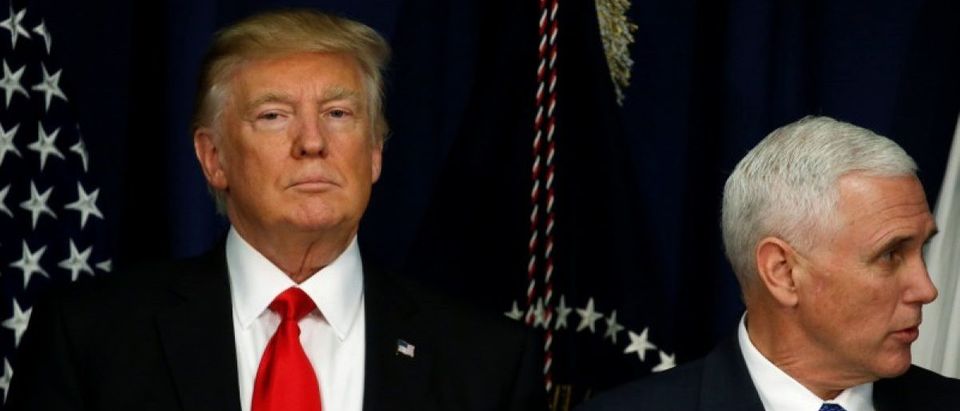It was after dawn when we began the long walk to the Capitol. The first thing I noticed were the red “Make American Great Again” hats. Soon, after the hassle of military security, I was wearing a poncho, suffering in British Open conditions, wondering why I had come to the inauguration at all.
Then there was his “America First” speech.
President Trump’s bellicose address was maligned by foes and the media. It was too brief. It was too blunt. It was anti-poetic. Critics, however, missed its muscular music, in the same way they had missed his wide appeal for the past year election.
The political intelligentsia were shocked, even appalled, by such a coarse address. Joe Scarborough said it was akin to Christmas without reference to baby Jesus. Charles Krauthammer said it was too dark. Overnight, everyone in Washington was suddenly brandishing the word “dystopian.”
Meanwhile, in the rest of America, it has been received with approval. Half polled liked the speech and over sixty percent felt it was positive, according to a POLITICO/Morning Consult poll, and his approval ratings are near sixty percent.
To say that Democrats in Washington are despondent over the election is a vast understatement. There is real anger and doom, but also a sense that something was stolen from them, and, more importantly, that the American canvas is being painted by a man morally unfit to brush his vision of the future.
His first week in office did not balm any wounds. Even Trump’s most ardent supporters would agree that his first week as President was a shock, an onslaught of fake news, executive orders, unusual speeches, and late night testosterone-charged tweets, one in which he threatened to send “the Feds” to Chicago if the Mayor could not get a handle on its chilling murder rate.
There is the sense now that one must check in every few hours to keep up with the galloping new Administration, all its gaffes, tweets, visa bans, possible revival of CIA black sites, and other breathtaking executive orders.
Simply put: Trump is doing exactly what he said he would do in his campaign.
The question worth asking is why is anyone surprised by what they are seeing?
For months, the American media speculated about how the author of the “Art of the Deal” would govern. President Trump, so far, is playing Jackson Pollock with people’s expectations, a consummate chameleon whose next move is entirely unpredictable.
The lightning speed, shock and braggadocio he is deploying to outshout and overwhelm foes and the White House press corps, who are all struggling to keep pace with the torrid tempo of tweets, are his main advantage.
Trump seems to thrive in situations where he can spring information on the public, especially the hours after nine o’clock at night, when his Twitter account fires out headlines that, in any other presidential administration, would have required careful scripting and a teleprompter.
But President Trump is much more than a Twitterer-in-Chief.
The main reason Mr. Trump came to Washington, I suspect, is to fatally lance America’s globalist impulses. Already, we are witness to the brinkmanship between the U.S. and Mexico and whether NAFTA can be renegotiated to President Trump’s satisfaction. The construction of a border wall financed by the Mexicans, a core campaign promise, seems like negotiating leverage.
President Pena Nieto has valiantly vowed to resist Trump but it seems a fait accompli the American President will get his way, somehow. The common wisdom is that President Trump, with his walls and TPP carnage, is pulling back from the rest of the world.
It’s become fashionable for global elites to refer to Chinese President Xi Jinping as the kingpin of globalism, even if China has consistently cheated its way into markets through dumping. What’s critical, they argue, is that someone stand for cross-border integration, never mind the cultural implications.
Yet, Trump won on the implications of global trade. The blue jobs that left blue states for Mexico and Vietnam and elsewhere boomeranged back as red hot anger at Washington and ravaged Hillary’s vaunted “Blue Wall.”
Drive for a while through western Pennsylvania on interstate 99 towards and you will see quite clearly the consequences of borderless trade has had on these communities; those rusted out factories like “tombstones,” as President Trump called them in his inaugural speech, are literally one after the other. Folks in these hollow towns are not pining for a “global vision”; they are simply trying to subsist.
Thus far, there is no formal counter-vision to Trump from Democrats. It’s a party struggling to find its core among a cadre of septuagenarian leaders.
Until Democrats can formulate a winning defense of globalism, and temper their coastal base, Trump will stampede through the world for the next four years, unopposed.
Mr. Bovim, a former Reuters correspondent in Madrid, is Managing Director of SIGNAL Group, a public affairs consultancy in Washington, D.C.


